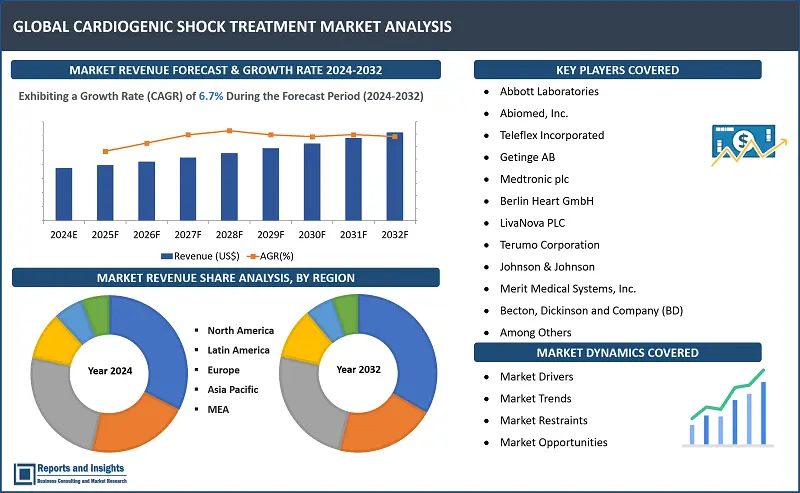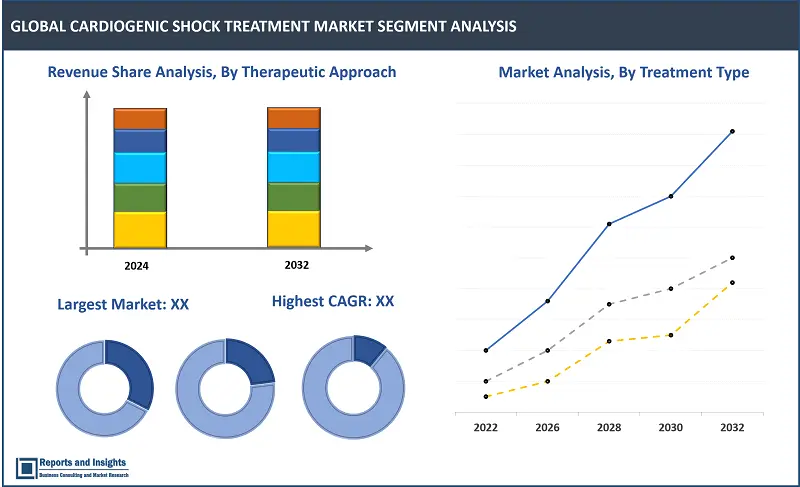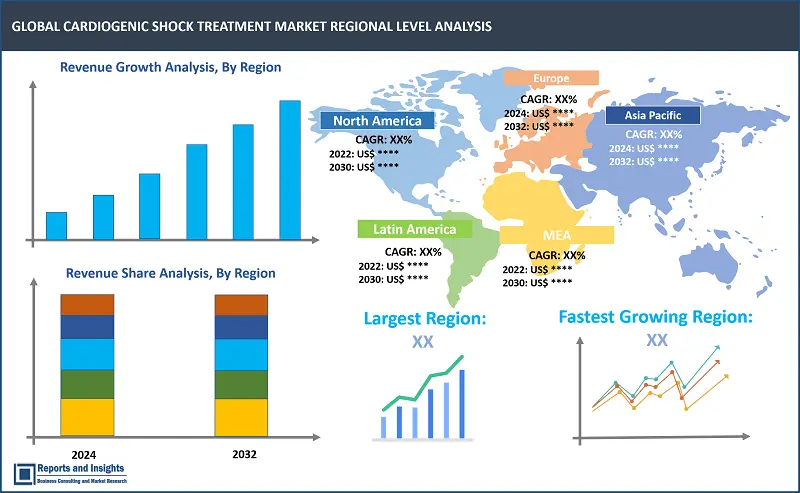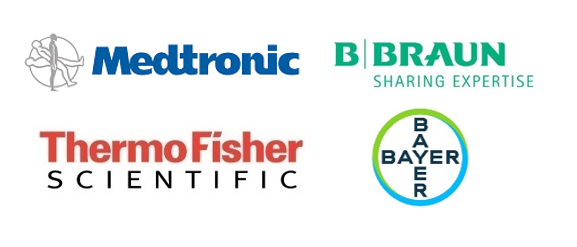Market Overview:
"The global cardiogenic shock treatment market size reached US$ 0.87 billion in 2023. Looking forward, Reports and Insights expects the market to reach US$ 1.56 billion in 2032, exhibiting a growth rate (CAGR) of 6.7% during 2024-2032."
|
Report Attributes |
Details |
|
Base Year |
2023 |
|
Forecast Years |
2024-2032 |
|
Historical Years |
2021-2023 |
|
Market Growth Rate (2024-2032) |
6.7% |
Cardiogenic shock is a critical condition characterized by the heart's inability to pump enough blood to meet the needs of the body. Common causes include acute myocardial infarction, severe heart failure, and cardiomyopathies. Symptoms include rapid breathing, confusion, weak pulse, and cold extremities, which without prompt intervention, can lead to organ failure and death.
Immediate interventions include delivering enriched oxygen via a tube or mask and breathing assistance. For severe cases, a ventilator may be employed to assist with breathing. Intravenous fluids are administered to maintain adequate blood volume. Medications play a crucial role, with vasopressors such as dopamine, epinephrine, and norepinephrine used to raise blood pressure. Inotropic agents like dopamine and dobutamine improve cardiac contractility. Medications to enhance the heart's pumping ability and reduce blood clot risks are also employed. Other treatments involve early restoration of coronary blood flow and the use of an Intra-Aortic Balloon Pump (IABP), which can enhance survival when coupled with an Extracorporeal Membrane Oxygenation (ECMO) device.
Advancements in cardiogenic shock treatment include cutting-edge technologies, improved surgical outcomes, and refined management approaches. Medications and drugs have evolved to enhance heart function and reduce complications. Key trends in the market include a growing focus on minimally invasive procedures, personalized treatment plans, and the development of novel pharmaceuticals. Some notable developments in the global cardiogenic shock treatment market involve the integration of Artificial Intelligence (AI) for personalized diagnostics and treatment optimization, as well as ongoing research into regenerative therapies for damaged cardiac tissue.

Cardiogenic Shock Treatment Market Trends and Drivers:
The rising prevalence of cardiovascular diseases, including acute myocardial infarction and heart failure, supported by a rapidly aging population and lifestyle-related risk factors is driving an incline in the incidence of cardiogenic shock cases and necessitating effective treatments. Advancements in medical technologies, particularly in mechanical circulatory support devices and minimally invasive procedures, are also resulting in an increasing number of patients opting for more effective procedures and treatments owing to rising awareness regarding these innovations enhancing treatment efficacy, reducing complications, and improving patient outcomes.
In addition, rising emphasis on personalized medicine is contributing to major changes in the healthcare sector. Tailoring treatments based on patients' genetic profiles and the development of targeted therapies are contributing to more effective and patient-centric interventions. Moreover, the integration of artificial intelligence in diagnostics and treatment planning is a significant trend, as AI-driven algorithms can enhance decision-making processes, aiding in early detection and personalized treatment strategies.
Furthermore, pharmaceutical advancements with the development of new medications and drugs for cardiogenic shock treatment are supporting market growth. Novel vasopressors, inotropic agents, and drugs targeting specific pathways are expanding the therapeutic arsenal. The global traction of these advancements is prominent in developed countries with robust healthcare infrastructures, such as the United States, Germany, and Japan. These countries have high treatment rates due to advanced medical facilities, research capabilities, and awareness programs. However, emerging economies are also witnessing increased adoption, driven by improving healthcare access and rising awareness.
Cardiogenic Shock Treatment Market Restraining Factors:
Complexity and invasiveness of treatments contribute to hesitancy, and surgical procedures and mechanical circulatory support devices, while effective, pose risks and complexities, leading some individuals to opt for conservative or less invasive options. Also, limited awareness and delayed diagnosis can hamper timely intervention. Many individuals are unaware of the symptoms of cardiogenic shock, resulting in delayed medical attention and reducing the effectiveness of treatments. Also, economic considerations play a significant role, as the high costs associated with advanced treatments, coupled with potential long-term care expenses, may deter patients, particularly those without adequate insurance coverage or financial resources. Costs associated with advanced technologies and interventions also pose financial barriers for healthcare institutions.
In addition, perceived risks and complications associated with certain interventions, such as the use of ventricular assist devices or intra-aortic balloon pumps, may discourage both patients and healthcare providers from pursuing these options. The lack of standardized treatment protocols also contribute to variability in approaches, creating uncertainty among healthcare professionals and affecting patient preferences.
Another major factor is reimbursement challenges and varying healthcare policies impacting adoption of expensive treatments, and limiting accessibility. The complexities and potential complications of certain treatments, such as managing mechanical circulatory support devices, may also deter widespread adoption. Regulatory hurdles and time-consuming approval processes for new therapies further delay market entry, restraining revenue growth. Addressing these challenges requires a focus on standardizing protocols, improving awareness, and developing cost-effective and streamlined approaches to enhance both preference for treatment and market growth.
Cardiogenic Shock Treatment Market Player Opportunities:
Advancements in telehealth and remote monitoring present a promising avenue for companies to develop and integrate digital health and telemedicine solutions to monitor patients with cardiogenic shock remotely, improving post-treatment care and reducing readmission rates. Personalized medicine and genetic therapies represent a frontier for innovation and tailoring treatments based on patients' genetic profiles can optimize therapeutic outcomes and minimize adverse effects. Companies investing in precision medicine for cardiogenic shock can differentiate themselves in the market and cater to the growing demand for personalized healthcare solutions. Also, development of patient-focused mobile applications can enhance patient engagement and adherence to treatment plans. Companies can create user-friendly apps that provide educational resources, medication reminders, and real-time health monitoring, fostering a more proactive approach to managing cardiogenic shock.
In addition, integrating Artificial Intelligence (AI) in diagnostic tools and treatment planning can streamline decision-making processes for healthcare providers. AI algorithms can analyze complex data sets, assist in early detection, and recommend personalized treatment strategies, contributing to more effective and efficient cardiogenic shock management. Moreover, exploring value-based care models and entering into partnerships with payers can align incentives for better patient outcomes.
Investing in Research and Development (R&D) for innovative treatment modalities and technologies can open new avenues. Breakthroughs in minimally invasive procedures, advanced mechanical circulatory support devices, and regenerative therapies can enable addressing untapped segments and meeting unmet clinical needs. Collaborating with healthcare institutions, research organizations, and technology firms can accelerate the development and adoption of novel treatments. Such partnerships can streamline clinical trials, facilitate regulatory approvals, and establish a robust network for technology dissemination. Also, expanding into emerging markets presents significant growth opportunities. The rising prevalence of cardiovascular diseases in developing regions creates a demand for advanced treatment options, offering companies a chance to tap into growing patient populations.
Cardiogenic Shock Treatment Market Segmentation:

By Treatment Type
- Medication-Based Therapy
- Invasive Procedures
- Mechanical Circulatory Support Devices
- Revascularization Strategies
The invasive procedures segment is expected to account for largest revenue share owing to increasing preference for interventional cardiology procedures, such as Percutaneous Coronary Intervention (PCI) and Coronary Artery Bypass Grafting (CABG), which are integral components of invasive treatments for cardiogenic shock. Advances in minimally invasive techniques and the rising prevalence of acute myocardial infarction also contribute to this segment's expected dominance among the other treatment types.
By Causes
- Acute Myocardial Infarction-Induced Cardiogenic Shock
- Severe Heart Failure-Related Cardiogenic Shock
- Cardiomyopathy-Associated Cardiogenic Shock
- Other Underlying Causes
Among the causes segments, the acute myocardial infarction-induced cardiogenic shock segment is expected to account for largest revenue share. High incidence of myocardial infarctions globally, coupled with the immediate need for effective cardiogenic shock interventions among this specific patient population is a key factor driving revenue growth of this segment.
By Therapeutic Approach
- Pharmacological Interventions
- Surgical Interventions
- Percutaneous Coronary Intervention (PCI)
- Supportive Care and Monitoring
Among the therapeutic approach segments, the pharmacological interventions category is expected to lead in terms of revenue share over the forecast period. This is supported by the widespread use of medications such as vasopressors and inotropic agents in the acute management of cardiogenic shock, emphasizing the critical role of pharmaceutical interventions in stabilizing patients.
By Technology and Innovation
- Telehealth and Remote Monitoring
- Artificial Intelligence in Diagnostics and Treatment Planning
- Precision Medicine and Genetic Therapies
- Mobile Applications for Patient Engagement
Among the technology and innovation segments, the artificial intelligence in diagnostics and treatment planning segment is projected to maintain dominance in terms of revenue share. This can be attributed to increasing integration of AI-driven algorithms for precise diagnostics, personalized treatment strategies, and streamlined decision-making, reflecting the industry's emphasis on cutting-edge technologies for improved patient outcomes.
By Region

North America
- United States
- Canada
Europe
- Germany
- United Kingdom
- France
- Italy
- Spain
- Russia
- Poland
- Benelux
- Nordic
- Rest of Europe
Asia Pacific
- China
- Japan
- India
- South Korea
- ASEAN
- Australia & New Zealand
- Rest of Asia Pacific
Latin America
- Brazil
- Mexico
- Argentina
Middle East & Africa
- Saudi Arabia
- South Africa
- United Arab Emirates
- Israel
- Rest of MEA
The global cardiogenic shock treatment market is divided into five key regions: North America, Europe, Asia Pacific, Latin America, and the Middle East and Africa. North America is a leading regional market, with the United States being a major revenue contributor due to advanced healthcare infrastructure and high prevalence of cardiovascular diseases. In Europe, countries such as Germany and the United Kingdom account for significant revenue contribution and innovation and advancements in the field, benefiting from robust healthcare systems. Asia Pacific market growth is supported majorly by countries such as China and Japan, driven by increasing focus on healthcare infrastructure development.
Some common factors driving overall growth of markets in these regions include rising prevalence of cardiovascular diseases, advancements in medical technologies, and increasing awareness about advanced treatment options.
Leading Companies in Cardiogenic Shock Treatment Market & Competitive Landscape:
The competitive landscape in the global cardiogenic shock treatment market is marked by intense rivalry among leading companies striving to maintain their positions and expand their consumer bases. Key players such as Abbott Laboratories, Abiomed, Inc., and Medtronic plc are adopting strategic approaches to stay competitive. These strategies include continuous R&D to innovate new treatment modalities and technologies, expanding geographic presence through mergers and acquisitions, and fostering collaborations with healthcare institutions to accelerate the development and adoption of novel therapies.
Also, companies focus on enhancing their product portfolios with advanced medical devices and pharmaceuticals. Digital health solutions, including telehealth and remote monitoring, are increasingly becoming integral to companies' strategies to improve patient outcomes and provide comprehensive healthcare solutions. Overall, the competitive landscape is characterized by a dynamic interplay of innovation, strategic partnerships, and a commitment to advancing the standard of care in cardiogenic shock treatment.
These companies include:
- Abbott Laboratories
- Abiomed, Inc.
- Teleflex Incorporated
- Getinge AB
- Medtronic plc
- Berlin Heart GmbH
- LivaNova PLC
- Terumo Corporation
- Johnson & Johnson
- Merit Medical Systems, Inc.
- Becton, Dickinson and Company (BD)
- Edwards Lifesciences Corporation
- Siemens Healthineers
- Cardinal Health, Inc.
Recent Development:
- January 2024: LivaNova PLC, which is a leading medical technology company, announced its decision to initiate an orderly wind down of the Advanced Circulatory Support (ACS) Business Unit. This strategic move aims to enhance the company's focus on its core Cardiopulmonary (CP) and Neuromodulation Business Units, and the wind-down process is projected to conclude by the end of 2024. During the first quarter of 2024, LivaNova will retain all ACS standalone cannulae products and associated accessories, including ProtekDuo, transseptal (TandemHeart), arterial and venous cannulae, which will be seamlessly integrated into the CP Business Unit's product portfolio. Operations and services for other ACS product lines, such as LifeSPARC and Hemolung Systems, will be discontinued by the end of the year. The company plans to provide support for scheduled service on the LifeSPARC and Hemolung platforms until the close of 2024.
- November 2023: Abiomed, which is a subsidiary of Johnson & Johnson MedTech, announced the commencement of the groundbreaking RECOVER IV Randomized Controlled Trial (RCT) with the enrollment of the first patient worldwide. This landmark trial aims to evaluate the efficacy of Impella support before Percutaneous Coronary Intervention (PCI) compared to PCI without Impella in patients experiencing Acute Myocardial Infarction (AMI) cardiogenic shock. The trial will randomize 548 patients to assess outcomes comprehensively. Impella stands as the sole mechanical circulatory support device approved by the United States Food and Drug Administration for the treatment of AMI cardiogenic shock. Several studies, including the Inova Study, the National Cardiogenic Shock Initiative (NCSI) Study, and the Japanese J-PVAD Study, have highlighted the significant enhancement in survival rates for AMI cardiogenic shock patients when Impella and best practices are employed. These practices involve utilizing Impella prior to PCI and promptly identifying shock cases.
Cardiogenic Shock Treatment Market Research Scope
|
Report Metric |
Report Details |
|
Market size available for the years |
2021-2023 |
|
Base Year |
2023 |
|
Forecast Period |
2024-2032 |
|
Compound Annual Growth Rate (CAGR) |
6.7% |
|
Segment covered |
Treatment Type, Causes, Therapeutic Approach, Technology and Innovation |
|
Regions Covered |
North America: The U.S. Canada Latin America: Brazil, Mexico, Argentina, & Rest of Latin America Asia Pacific: China, India, Japan, Australia & New Zealand, ASEAN, & Rest of Asia Pacific Europe: Germany, The U.K., France, Spain, Italy, Russia, Poland, BENELUX, NORDIC, & Rest of Europe The Middle East & Africa: Saudi Arabia, United Arab Emirates, South Africa, Egypt, Israel, and Rest of MEA |
|
Fastest Growing Country in Europe |
UK |
|
Largest Market |
North America |
|
Key Players |
Abbott Laboratories, Abiomed, Inc., Teleflex Incorporated, Getinge AB, Medtronic plc, Berlin Heart GmbH, LivaNova PLC, Terumo Corporation, Johnson & Johnson, Merit Medical Systems, Inc., Becton, Dickinson and Company (BD), Edwards Lifesciences Corporation, Siemens Healthineers, Cardinal Health, Inc. |
Frequently Asked Question
What is the size of the global cardiogenic shock treatment market in 2022?
The global cardiogenic shock treatment market size reached US$ 0.87 Billion in 2023.
At what CAGR will the global cardiogenic shock treatment market expand?
The global market is expected to register a 6.7% CAGR through 2024-2032.
Who are leaders in the cardiogenic shock treatment market?
Abbott Laboratories, Abiomed, Inc., and Medtronic plc are recognized for their significant contributions to the market.
What are some key factors driving revenue growth of the Cardiogenic shock treatment market?
Key factors driving revenue growth in the cardiogenic shock treatment market include the increasing prevalence of cardiovascular diseases, advancements in medical technologies, rising focus on personalized medicine, and development of innovative treatment modalities. Also, strategic collaborations, geographic expansion, and digital health solutions contribute to market growth.
What are some major challenges faced by companies in the cardiogenic shock treatment market?
Major challenges faced by companies in the cardiogenic shock treatment market include the complexity and invasiveness of treatments, limited awareness leading to delayed diagnosis, economic considerations impacting accessibility, perceived risks and complications associated with interventions, and the lack of standardized treatment protocols. Regulatory hurdles and the rapid obsolescence of existing treatments also pose challenges.
How is the competitive landscape in the cardiogenic shock treatment market?
The competitive landscape in the cardiogenic shock treatment market is characterized by the presence of key players such as Abbott Laboratories, Abiomed, Inc., Medtronic plc, and others. Companies compete through innovations in medical devices, pharmaceuticals, and digital health solutions. Strategic partnerships, mergers, and acquisitions are common strategies to enhance market position.
How is the global cardiogenic shock treatment market report segmented?
The global cardiogenic shock treatment market report segmentation is based on Treatment Type, Causes, Therapeutic Approach, Technology and Innovation, and Region.
Who are the key players in the global cardiogenic shock treatment market report?
Key players in the global cardiogenic shock treatment market report include Abbott Laboratories, Abiomed, Inc., Teleflex Incorporated, Getinge AB, Medtronic plc, Berlin Heart GmbH, LivaNova PLC, Terumo Corporation, Johnson & Johnson, Merit Medical Systems, Inc., Becton, Dickinson and Company (BD), Edwards Lifesciences Corporation, Siemens Healthineers, Cardinal Health, Inc.

